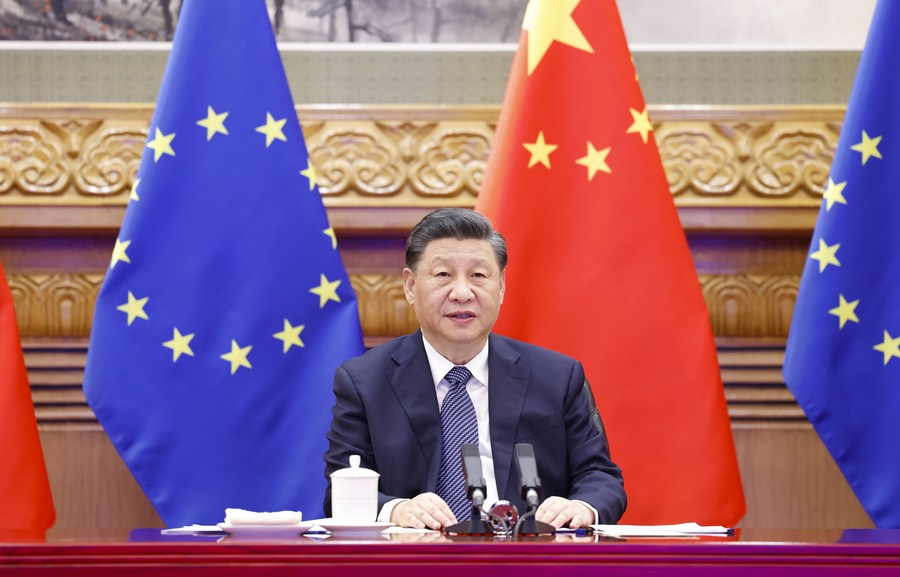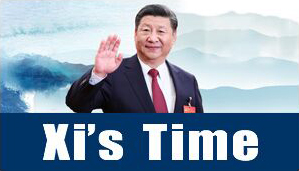
Chinese President Xi Jinping meets with European Council President Charles Michel and European Commission President Ursula von der Leyen via video link in Beijing, capital of China, April 1, 2022. (Xinhua/Huang Jingwen)
BEIJING, April 2 (Xinhua) -- Chinese President Xi Jinping met via video link with President Charles Michel of the European Council and President Ursula von der Leyen of the European Commission in Beijing on the evening of April 1.
President Xi recalled that he made a suggestion eight years ago for China and Europe to foster a China-EU partnership for peace, growth, reform and civilization. China's vision remains unchanged. If anything, it has become more relevant under the current circumstances. China and the EU share extensive common interests and a solid foundation for cooperation.
Noting the consistency and continuity of China's EU policy, President Xi called on the EU to form its own perception of China, adopt an independent China policy, and work with China to promote the steady and sustained growth of China-EU relations and to add stabilizing factors to a turbulent world.
President Xi stressed that China and the EU should act as two major forces upholding world peace, and offset uncertainties in the international landscape with the stability of China-EU relations. The two sides need to take the lead in defending the international system with the UN at its core, the international order underpinned by international law, and the basic norms governing international relations based on the purposes and principles of the UN Charter, and jointly reject the resurrection of rival-bloc mentality and oppose attempts at a new Cold War, with a view to maintaining world peace and stability.
President Xi pointed out that China and the EU should act as two big markets promoting shared development, and deepen economic globalization through open cooperation. China will stay committed to deepening reform and further opening up. China welcomes European business investment and expects the EU to provide a fair, transparent and nondiscriminatory environment for Chinese business investment and development in Europe. The two sides need to seek greater synergy between their development strategies and explore more complementarity between China's new development philosophy and paradigm and the EU's trade policy for open strategic autonomy.
President Xi underscored that China and the EU should act as two great civilizations promoting human progress, and meet global challenges through solidarity and collaboration. The two sides need to follow true multilateralism, advocate a vision of global governance featuring the principle of extensive consultation, joint contribution and shared benefits, continue to spearhead international cooperation on climate change and biodiversity, and work together to defeat COVID-19. China welcomes the EU's support for and participation in the Global Development Initiative.
President Michel and President von der Leyen said that China is an important force in the world. The EU attaches great importance to China's international standing and role, and to developing relations with China. China and the EU enjoy a longstanding relationship of mutual benefit. Both sides are committed to defending peace and multilateralism. Under the current international situation, it is vital for the EU and China to increase dialogue and cooperation. The EU side reaffirmed its commitment to the one-China principle and expressed its desire for candid exchanges with China to sustain the good momentum of EU-China relations. It also expressed readiness to keep deepening cooperation with China in such fields as economy, trade, investment, energy and green development, to jointly confront global challenges like COVID-19, climate change, and protection of biodiversity and promote world peace, economic growth and common prosperity. The EU will provide support and cooperation for the success of the second part of COP15 in China.
The two sides exchanged views on the situation in Ukraine. The EU leaders shared their views and propositions on the Ukraine crisis.
President Xi emphasized that China finds it deeply regrettable that the situation in Ukraine has come to where it is today. China's position on the Ukraine issue is consistent and clear-cut. China always stands on the side of peace and draws its conclusion independently based on the merits of each matter. China calls for upholding international law and universally recognized norms governing international relations, acts in accordance with the purposes and principles of the UN Charter, and advocates the vision of common, comprehensive, cooperative and sustainable security.
President Xi shared his views on how to settle the Ukraine crisis under the current circumstances:
First, promoting peace talks. China supports the EU's efforts toward a political settlement of the Ukraine issue, and has been encouraging peace talks in its own way. Peace talks are the only viable way to prevent an escalation of tensions. The international community should keep creating favorable conditions and environment for the negotiations between Russia and Ukraine and make room for political settlement, rather than add fuel to the fire and heighten tensions.
Second, preventing a humanitarian crisis on a bigger scale. China has put forward a six-point initiative on the humanitarian situation in Ukraine, provided multiple batches of emergency humanitarian assistance to Ukraine, and sent supplies to European countries receiving large numbers of refugees. China will stay in touch with the EU to prevent a bigger humanitarian crisis.
Third, fostering lasting peace in Europe and the Eurasian continent. The root cause of the Ukraine crisis is the regional security tensions in Europe that have built up over the years. A fundamental solution is to accommodate the legitimate security concerns of all relevant parties. In this day and age, global and regional security frameworks should no longer be built with a Cold War mentality. China supports Europe, especially the EU, in playing a primary role, and supports Europe, Russia, the U.S. and NATO in holding dialogue to face up to the tensions that have built up over the years and find solutions, so as to build a balanced, effective and sustainable security framework in Europe.
Fourth, preventing the regional conflict from magnifying. The Ukraine crisis must be handled properly. One should not take the wrong medicine, or focus on just one aspect of the issue without regard to the rest, or hold the entire world hostage, still less make ordinary people around the world suffer as a result. The more critical the situation, the greater the need to stay levelheaded. The current global economic configuration is the result of longstanding efforts by all countries. It is an integral whole. Parties should cherish this outcome, and must not let the global economic system be disrupted at will, still less allow attempts to politicize or weaponize the world economy as a tool to serve one's own agenda, as such attempts will trigger serious crises in global finance, trade, energy, technology, food, industrial and supply chains, among others. Many are worried that the current situation may wipe out the fruits of international economic cooperation gained through decades of efforts. Should the situation continue to worsen, it may take years, if not decades, to get things back on track. China and the EU need to commit themselves to keeping the situation under control, preventing spillover of the crisis, and, most importantly, keeping the system, rules and foundation of the world economy stable, in order to bolster public confidence. The two sides may carry out coordination and cooperation in this regard.
Leaders of both sides agreed that this has been a candid and in-depth discussion in which the two sides increased mutual understanding and reached common understandings in many areas. They agreed to step up communication and exchanges and keep up coordination and cooperation. ■




